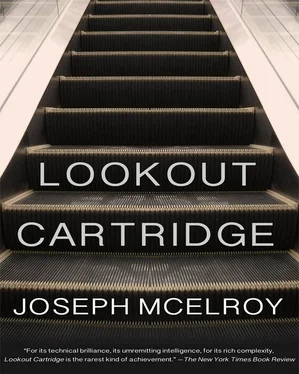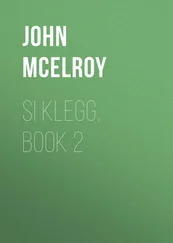Joseph McElroy - Lookout Cartridge
Здесь есть возможность читать онлайн «Joseph McElroy - Lookout Cartridge» весь текст электронной книги совершенно бесплатно (целиком полную версию без сокращений). В некоторых случаях можно слушать аудио, скачать через торрент в формате fb2 и присутствует краткое содержание. Год выпуска: 2014, ISBN: 2014, Издательство: Dzanc Books, Жанр: Современная проза, на английском языке. Описание произведения, (предисловие) а так же отзывы посетителей доступны на портале библиотеки ЛибКат.
- Название:Lookout Cartridge
- Автор:
- Издательство:Dzanc Books
- Жанр:
- Год:2014
- ISBN:9781941088036
- Рейтинг книги:3 / 5. Голосов: 1
-
Избранное:Добавить в избранное
- Отзывы:
-
Ваша оценка:
- 60
- 1
- 2
- 3
- 4
- 5
Lookout Cartridge: краткое содержание, описание и аннотация
Предлагаем к чтению аннотацию, описание, краткое содержание или предисловие (зависит от того, что написал сам автор книги «Lookout Cartridge»). Если вы не нашли необходимую информацию о книге — напишите в комментариях, мы постараемся отыскать её.
Lookout Cartridge — читать онлайн бесплатно полную книгу (весь текст) целиком
Ниже представлен текст книги, разбитый по страницам. Система сохранения места последней прочитанной страницы, позволяет с удобством читать онлайн бесплатно книгу «Lookout Cartridge», без необходимости каждый раз заново искать на чём Вы остановились. Поставьте закладку, и сможете в любой момент перейти на страницу, на которой закончили чтение.
Интервал:
Закладка:
She drawled her East Coast American words so you felt it didn’t matter what country she moved in, she’d immediately know what to do. The kind of woman Dudley Allott might have married if he’d been more worldly and more sensible and more evidently strong.
I asked Dagger who Gene was; Dagger said, The genius she’s married to. She received us in the manner of a Radcliffe girl I once met who was rich on her own account but married to a staggeringly famous folk singer and was used to people all over the house playing harmonicas and guitars and was as undemonstrative toward them as if they’d been familiar workmen hired by the hour. She shook hands, said to Dagger, You know the problems, and asked what exactly he would want to shoot. Some children passed through the hall. There was music upstairs, oriental and baroque at once on dulcimers and xylophones I thought. We never got upstairs and the young woman in overalls was not the sort of person you ask Who’s that upstairs?
Sherman appeared with his rucksack. You could not have told from inside that the house was egg-shaped, much less as circular as the wall outside falsely suggested, even though the dining room where three people were eating peanut butter and buckwheat spaghetti had decoratively rounded corners.
We were getting ready to film the old oak hall and from it the view through the width of the huge living room to the trees outside. After a while the children appeared again in red and yellow and olive green macs. They ran back and forth in front of Dagger’s camera and giggled in front of it. Gene’s wife had gone back into the dining room. We shot a coat of arms and a little boy sitting in a great high-backed chair beside a tall pale-green porcelana pot that held umbrellas and knobby, gnarled walking sticks. The children went out again into the living rain and we shot them opening the door, and I asked them to do it again and I took the Beaulieu and turned the turret to the 50mm. lens and they trampled back inside sheepishly and I caught their colors retreating onto the gray step with the grass a green blur beyond and the wall stones a gray haze.
We set up for the large dining room. The occupants didn’t stop their talking, they took us for granted. A giant hearth with copper kettles hanging, a pink eighteenth-century gentleman in a frame above a dark cupboard where pewter tankards were ranged — and a deep chill the camera must have taken in. I had the headset over one ear, and the resulting mix, though without noticeable reception delay, was subtler than what got onto tape.
The three eaters were, from left to right: first, a fat, acid Englishman in a green tweed hacking jacket who somehow kept inserting into the curious conversation the American airports he had used in his two hundred-odd “invasions” of America, the most satisfactory being O’Hare in Chicago; second, a tan young bald-headed American who spoke of radio telescopes in New Mexico and worked as far as I could tell for some foundation in Taos that had a lot of cottages, and he addressed the far man (with a note of irritation in his voice) as John and was addressed by Gene’s wife when she came in after a while as Lem or Len, and was of interest to me in another way I’ll explain presently; third, the one person here I’d already met, in fact played ball with in Hyde Park, for whom this was the second appearance in our film — this was the black man Chad who’d been up at Oxford on a Rhodes, and he had lately finished his degree in Philosophy, Politics, and Economics. He said hello. He was from the Bronx but you might not guess unless you listened very hard or saw him dig in at the plate waving the bat high, because he had had tribal cuts opened into his cheeks, three on each side, though he may have been much less interested in magic medicine than in policy and maneuvers. Herma, the American girl, was at the end of the table on our right, Elizabeth and her boyfriend on the left. The other English boy was out with the kids and I saw him dash past the window and slip and fall on the patio near the café umbrella and TV set, get up and run away perhaps pursued by a child, but I didn’t see. We rigged the omnidirectional mike on the long dining table behind the jar of peanut butter running the wire off the table at the side away from us and hiding it under the spread-out pages of the Sunday Observer . My idea was to use some of their talk when they weren’t on camera (even though that talk would be synchronized with whatever else in the way of objects we were shooting) and use it as sound track behind what we already had of the children and the hall, thus an adult collage in insignificant accents like a kind of audible projection into the future of those rustling color-visions of children in their slickers, and I hoped the sharp close-up of the tough little boy no more than eight shoving his cheeks right into Dagger’s lens would say a lot when behind that simple energy you heard the rambling drone of two men’s voices touching upon nutrition, space, or ideology. At one point in our day, imagining we’d have more time than it turned out we did have, I said we must tape the kids talking, they could make up a round-robin horror story to cut in behind our discussing adult faces that we’d already begun filming, and Herma who paid me a lot of attention in the absence of Sherman called from the far end of the table that that would be beautiful. Dagger by then was inserting a fresh magazine. My plan was when we had it all together, say in a month, to splice in shots of the English landscape there, the Frisian bull black and white against the damp blue sweater of the bearded booted young dairy farmer tramping through his field, and then near the church the graystone vicarage discovered from the side showing a flat lawn and white croquet wickets — the vicar too, for Gene’s wife said he’d been to America and looked like Hollywood’s idea of a Church of England skypilot and she could see him with her parents caressing their sherry glasses — I say this was some of the plan, brief cuts into these outer visions to establish a context and transform it strongly, suggesting an environment at least English, possibly mingling England and America, subtly and firmly adding this to the bulk of our Marvelous Country House footage as you can add scale or emotion in a commercial film by cutting in music. Herma’s soft sex might do something to the three plates of buckwheat spaghetti diminishing in front of the three different faces of the men upon whom we’d intruded, and Elizabeth might irritate someone. But my first sense was that no one was going to jump through the window, and the relation of the monumental dining table to the men sitting at it left to right, fat, bald, black, was not going to flash onto our Anscochrome spawning vectors of mortality or enclosing any notable sense of space or stasis. Something like that was what I wanted, there was no plot, or none so far, but in my heart I thought I knew what we were going to get and in some eerie anticipation Dagger was going to get what he really wanted through getting what I pushed him to get in the process of our film. I don’t deny the editing later is crucial, but I don’t like all this cutting-room crucialness you hear about. I once went to a film theater and sat in an enclosed booth-seat itself so dark I felt ensured by velvet, and so toned or reinforced by the quarter-canopy that came above the back of the seat I felt like a spy-king even to the extent of feeling the electric danger of palace assassins, and I sat as if alone there in New York one night though very conscious of a couple of girls now out of sight in their niches in the row below mine, and I saw an ancient film about Eskimos that I later heard had little or no editorial cutting and no retakes at all. I wondered what it would have been like if there’d been all that after-the-fact doctoring, and on this day of the Marvelous Country House I had begun outside at the wall and its allegorical gate and in the hall with its aloof young proprietress and a few live children growing before your eyes irrespective of where on earth they were and one little girl chirping to me We had the June monsoon this year. Which was what the tabloids had called it with that faint tropical echo at some firm musical remove connecting the English mind to the empire gone by. But coming into this room with a not disagreeable faint scent of vomit from the grated cheese sprinkled on the hot spaghetti and the warm smell of peanut butter shining up out of the open jar, I’d felt something wrong with the triumvirate. It was perhaps that they didn’t acknowledge us, didn’t object or joke, or act interested in the equipment, and Dagger out of character didn’t get at them to make them laugh or get mad; he might well have been under the spell of Gene’s wife somewhere else in the house who had said she’d rather we just filmed in the dining room or outside the house, and of course it was raining though not on the moon.
Читать дальшеИнтервал:
Закладка:
Похожие книги на «Lookout Cartridge»
Представляем Вашему вниманию похожие книги на «Lookout Cartridge» списком для выбора. Мы отобрали схожую по названию и смыслу литературу в надежде предоставить читателям больше вариантов отыскать новые, интересные, ещё непрочитанные произведения.
Обсуждение, отзывы о книге «Lookout Cartridge» и просто собственные мнения читателей. Оставьте ваши комментарии, напишите, что Вы думаете о произведении, его смысле или главных героях. Укажите что конкретно понравилось, а что нет, и почему Вы так считаете.












